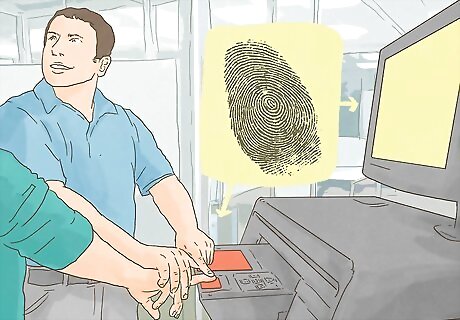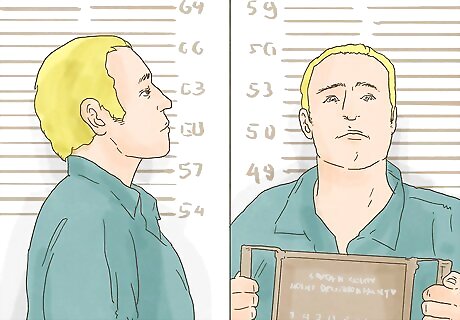
views
X
Research source
Someone's criminal record is usually a culmination of local, state, and federal information.[2]
X
Research source
Criminal records will usually include misdemeanor and felony convictions, pending charges, acquitted charges, and any ongoing criminal proceedings.[3]
X
Research source
However, expunged convictions will usually not be included in any criminal record.[4]
X
Research source
Common uses for criminal records include: employment, school admittance, military service, security clearance, buying a firearm, certain types of licensing, and law enforcement purposes.[5]
X
Research source
If you need to access criminal records for a lawful purpose, follow the instructions below.
- To find your own federal record, mail an Identity History Summary Request Form, fingerprint check, and payment to the FBI CJIS Division.
- To find someone else’s federal history, check federal courthouse records or run a paid search on the Public Access to Court Electronic Records (PACER) site.
- To request local or state records, contact local police departments and court clerks, or make a public records request to your state.
- To run an employment background check, inform the employee you’ll be conducting a check, then hire a Consumer Reporting Agency to run a report.
Requesting Your Own Federal Criminal Records

Understand who can request a Federal Bureau of Investigation (FBI) Identity History Summary. Obtaining federal criminal records involves accessing the FBI website and requesting a copy of your Identity History Summary, which is the FBI's name for a criminal history report. The FBI only allows you to request a copy of your own Identity History Summary, meaning you will not be able to look up someone else's federal criminal records through the FBI's database.

Complete an Applicant Information Form. If you are looking for your federal criminal records, you will start by visiting the FBI's website and filling out the Applicant Information Form. This form will ask you for the following information: Your name; Your date of birth; The last four digits of your Social Security Number; Your identifying information (e.g., your height, weight, hair color, and eye color); Your home address and the address you would like your records sent to; The reason for your request; and Your signature.

Obtain a set of your fingerprints. Once you have completed your Applicant Information Form, you will need to get your fingerprints taken and the original copy of your fingerprints must be sent in with the rest of your application. To obtain your fingerprints, go to your local law enforcement agency or sheriff's office and they should have a fingerprint technician available. The fingerprint technician will have a fingerprint card available and your name and date of birth must be provided on that card. To ensure a satisfactory experience, bring a standard fingerprint form (FD-258) with you when you go to get your fingerprints taken.

Submit your required payment. In order to receive a copy of your criminal records, you must provide an $18 payment in the form of a certified check, money order, or a credit card. Cash, personal checks, and business checks will not be accepted.

Review the Identity History Summary Request Checklist. In order to ensure you have completed all the required information and you are ready to send in your application, review this checklist. Once you are able to cross off all of the boxes on the checklist, you will be ready to send in your application.

Mail the required items. When you are ready to mail in your application, gather your Applicant Information Form, your completed fingerprint card, and your payment. Mail all of those documents to FBI CJIS Division - Summary Request, 1000 Custer Hollow Road, Clarksburg, West Virginia 26306.
Obtaining Someone Else's Federal Criminal History

Check federal courthouses. When someone is arrested and/or convicted of a federal crime, it is a public event and records of that event can usually be accessed by anyone that knows where to look. The most reliable place for you to access someone else's federal criminal records is at the federal courthouse where that person was tried. Each federal courthouse will have a clerk of courts. This clerk of courts will be able to access someone's criminal records so long as you give them the information they need to find those records. The most important information to have will be the person's name and their birth date. Additional helpful information may include the charges they had against them; any case numbers; and a social security number. Give the clerk of courts the information you have and they will check their records. You may have to go to multiple courthouses to find multiple records if an individual has been convicted in a number of different states or cities.

Use online services to obtain information. The federal government provides certain online services that you can use to access public criminal records. Two of the most important government services are the Public Access to Court Electronic Records (PACER) site and the National Sex Offender Public Website (NSOPW). The PACER site is a federal database that allows users to access docket information from federal courts. Once you register, you will use the information you have about the individual to search for their court records. Be aware that this service is not free and you may have to pay certain fees to access, download, and print the records you are looking for. The NSOPW site is a federal database that provides detailed information about people arrested and convicted for sex crimes. To use this site, simply go to the homepage and click on the button that says "search." Once you agree to the terms of use, a screen will appear that allows you to make searches based on name, address radius, or zip code. Input this information and search results will appear.

Conduct a search online for mugshots. Another way to find federal criminal records is to perform an online search for mugshots. All you need to do is open Google, or any other search engine you wish to use, and type in a person's name with the word "mugshot" after it. The search engine will provide you with the most relevant information. Be aware that this method is not fool proof and should only be used when the other methods mentioned do not provide your desired results.
Requesting Local or State Criminal Records

Know who can request local or state criminal records. Unlike an FBI Identity History Summary, which can only be accessed by the person whose name appears on the records, a lot of state and local criminal records can be accessed by others. Before you try and find state or local criminal records, decide whether you will have access to the records you are looking for. You can always access your own criminal records. Consent is usually required before someone else can access your criminal records. Common situations in which an individual may ask for your criminal records include purchasing a gun from a firearms dealer; private school applications; and applications for jobs. For example, a prospective employer may ask you to consent to a criminal history check on their employment application. While you can certainly deny that request, the employer may see this as a deal breaker and decide to pursue someone else. However, depending on the state you live in, some criminal records will be public and no consent will be needed for access. For example, in Montana, the public can receive arrest and court information on felony and misdemeanor charges. Also, in every state, the general public can obtain certain information about a person's sex crimes. In general, if you are trying to find and access your own criminal records, you will be able to do so with out many impediments. If you are trying to find someone else's criminal records, always ask for and receive consent unless you know the records are public.

Go to your local or state police department. if you are looking for local or state criminal records, you will want to start your search by visiting your local or state police department. Police departments will usually have records of all criminal activity having taken place in their jurisdiction. Some police departments may require you to make a request in person, while other departments may allow you to make a request over the phone or even online. For example, in Pennsylvania, you can make an online request for criminal records by accessing their Pennsylvania Access to Criminal History website. Once you access the site, you will start a new records request and follow the on-screen instructions. You will be asked to provide the name and address of the person whose records you are requesting, and you will be asked to provide a reason for the request. Once you have provided the required information, you will be required to pay $10 for each request you make. Once you have paid your request will be processed, which usually takes between two and three weeks. If you are requesting records in person, go to your local police department and ask the information desk for help making a criminal history request. There will usually be a form you will fill out, you will have to provide acceptable identification, and you will have to pay a required fee.

Check with your local or state clerk of courts. Another place you can look for criminal history records is your local courthouse, which will usually have records regarding ongoing criminal cases. These records may include criminal charges, indictments, court filings, and case numbers. To search for these criminal records, go to your local courthouse and ask for help obtaining these records. Each courthouse will conduct these searches differently. Some counties may allow you to search for these records online. For example, Miami-Dade County, Florida allows you to search for cases taking place, or having taken place, in that county. In order to search for a case, you will need to know the case number.

Submit a public records request. Each state has a law allowing citizens to request public records. Any public criminal record that is in your state's database will be searchable and obtainable. In order to access these records, you will need to make a public records request, which involves writing a letter or email to the correct agency detailing the records you are looking for. Each state's public records request laws are different, so be sure to check with your state in order to make a valid request. Look here for your state's public records laws. Once at the website, simply click on the state you are trying to make a request in, and you will gain access to that state's laws and requirements. Look here for a sample letter from every state. Use these letters as templates when you begin writing your own request.
Performing a Background Check for Employment Purposes

Tell the employee or applicant about the background check. The Fair Credit Reporting Act (FCRA) requires that employers inform job applicants of their intent to perform a background check. They must also inform applicants that the information obtained will be used to make the employment decision. You must notify the applicant of these facts in writing. The written notification cannot have any other information on it. It must be on its own page. Also state whether or not you intend to check on the employee’s criminal history throughout their employment. Employees and applicants must be notified that you intend to do future checks. You must get written permission from the employee or applicant.

Research your state law. State law may add other limitations on the use of a criminal background check in employment decisions. Accordingly, you need to read up on your state law or seek the counsel of an employment attorney. The FCRA allows reports to gather information as far back as seven years, however a few states won't allow even criminal records older than seven years to be disclosed in a background check. Some states prohibit the use of criminal records. Hawaii, for example, prohibits any inquiry into criminal history until after the employer has extended a conditional offer. Massachusetts also prohibits employers from even asking about criminal history on an initial job application. The use of an applicant’s credit history may also be limited or prohibited. In Illinois, for example, an employer may not use information about credit history in a hiring decision, unless the applicant has applied for a job in a limited set of industries (such as banking or insurance).

Find accredited Consumer Reporting Agencies (CRAs). The Fair Credit Report Act limits who can legally access a person’s consumer report. Only someone with a valid reason may access a person’s credit reports. A CRA collects information and background reports by culling the information from a variety of databases, some of which it pays to gain access to. To find CRAs, visit the National Association of Professional Background Screeners website. This organization accredits agencies who pledge to abide by a published code of conduct. From the list of results, you can click through to each company’s website. Each company's website provides additional information about the services it offers.

Narrow down your list of CRAs. Once you identified CRAs in your city or state, you should research further to see which are legitimate. If you want, you could pick a member of the NAPBS, which should be legitimate. But if you decide to try a non-accredited company, call up (or email) and ask the following: Can they provide you with references or a copy of their business license? Do they have controls in place that mandate compliance with FCRA regulations? Does the company have insurance? If the company’s answer is “No” to any of these questions, look elsewhere, regardless of how good of a deal the company is offering.

Hire a CRA. Once you hire an agency, you initiate the process by certifying that you have followed the appropriate procedures. For instance, you must certify that you complied with FCRA regulations by obtaining the applicant’s signature after informing him or her that you intended to perform a background check. Furthermore, you must certify that you will not break any discrimination laws based on information contained in the person’s consumer report.

Order a report from the CRA. A consumer report will contain information about criminal records and employment/credit history. Under federal law, CRAs generally will not reveal civil lawsuits, civil judgments, arrests, accounts out for collection, or paid tax liens if they happened more than seven years ago. Furthermore, the report will not contain information about bankruptcies more than 10 years’ old. However, if you need to go back more than 10 years, you can request that the history is included in your report. Of course, state law limits what you can request. State law may not allow you to request information older than seven years.

Make a hiring decision. If a consumer report contains information that dissuades you from hiring a person, you must inform the applicant of this fact. You must notify the applicant so that he or she can challenge the information, if necessary. To discharge your duties, you must: Inform the person that there is negative information in the report. Give the applicant the name of the CRA that you used. Supply the applicant with a copy of the “Summary of Your Rights under FCRA.” (You should have received this from the CRA you hired). Provide the applicant with an opportunity to rebut the information in the report. This rebuttal can be in the form of a letter outlining why the background check is wrong.




















Comments
0 comment